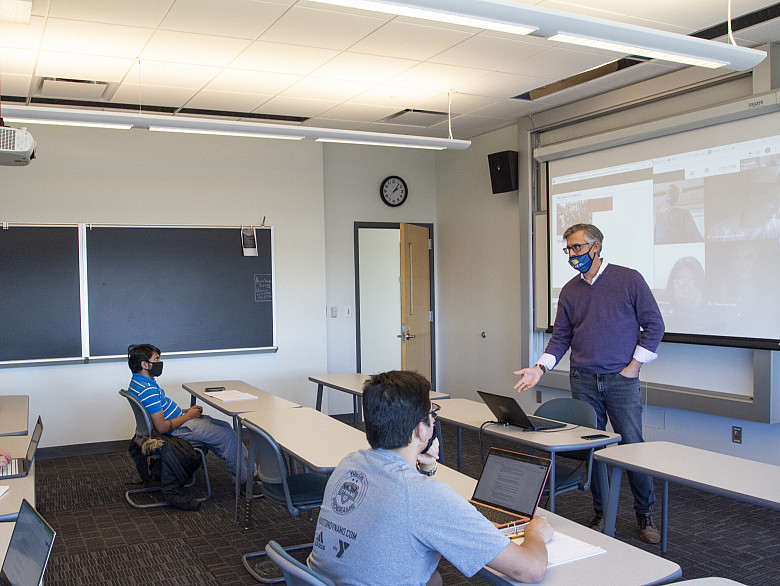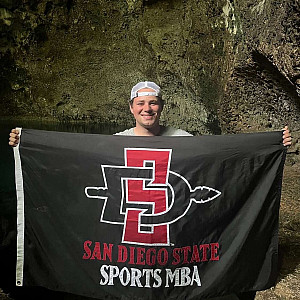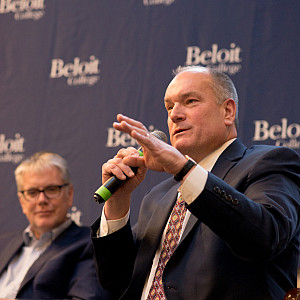When a classroom becomes a boardroom
Beloit students taking Navigating Your (Business) Career can learn about being a young professional on a work team that addresses the world’s uncertainty. And they don’t have to be business or economics majors.
Matt Laszlo’92, a former Fortune 500 executive and the college’s first Executive in Residence, leads the course, engaging students on leadership and decision-making, no matter their interests.
After pivoting to an online format for his new course back in March, Lazlo returned to campus this fall to teach the class again—this time sporting a mask.
Laszlo drew upon his own experiences in businesses large and small while piloting and simultaneously adjusting the class to fit the pandemic’s demands and his students’ needs.
“I give them an understanding of what they’re going to encounter early in their career as employees within a business, so they can recognize those things and therefore be more comfortable when they happen and more effective as a result,” he says.
Laszlo worked for The Clorox Company in Oakland, Calif., for 14 years, most recently as the company’s senior vice president and chief customer officer. He left in 2019 to start his own business advising startups.
An alumnus and Bay Area success story seemed the appropriate person to help launch the new program.
Beloit already hosts annual “residencies,” like the Crom Visiting Philosopher and the Weissberg Chair in International Studies. Those honorees spend about a week on campus, delivering guest lectures, visiting classes, and eating lunch with students.
Yet some Beloiters wanted more.
So Laura Grube’05, assistant professor of economics, teamed up with Jon Urish’96, assistant vice president for Development & Alumni Relations, and Amy Wilson, vice president for Development & Alumni Relations, to secure pilot funding to launch the Executives in Residence program.
Former Beloit College trustee Chuck McQuaid (P’11) generously stepped up to support the first Executive-in-Residence position with funding provided by the Chuck & Monica McQuaid Family Foundation.
Urish says a goal of the program is to have students spend an entire semester with a professor “who’s been out there dealing with the wonderful messiness of the world” in the field that interests those students, and whose “ability to navigate that world will inform the class.”
Laszlo had already been engaged with his alma mater before the program was conceived. He’d given a guest lecture in a business management course a few years earlier and extended opportunities at Clorox to recent Beloit graduates.
He was also involved in an initiative proposed by Danny O’Leary’20, former senior class co-president and a student of Laszlo’s last spring. The networking platform, called Beloiters Helping Beloiters, pairs graduates with alumni in the fields they hope to enter. (For more, see our magazine story from June 2020.)
As a student, Laszlo studied economics and journalism, played football and baseball, and worked as an RA and on The Round Table and WBCR radio. After graduating, he worked in the communications departments of trade magazines and manufacturers before accepting a marketing job at Clorox in 2005.
Grube says Laszlo was “the obvious choice” for Beloit’s first Executive in Residence once the first year of funding was in place. He’d already proven to be an effective teacher and also seemed instantly comfortable on campus. Laszlo’s rapport with Beloit students was a huge asset in a small classroom setting, especially with a handful of his students taking the course from their homes across the world.
“Every time you enter class, he has something to ask every student,” says Sonali Pendharkar’21. “He connects with everyone on a personal level. I feel like I can speak, I can make a mistake, and it’ll be fine. That’s so important, especially with how it translates into business. If you don’t have good relations, you’re never going to be able to advertise or publicize your product.”
Laszlo also incorporates his experiences into his teaching by staging the room as a casual board meeting. “I treat the class as though we are a working team within a business,” Laszlo says. “The way it’s structured is that I’m the leader of that team and you’re on my team. I encourage feedback in real time within the class, which addresses how they will give feedback and say what they really think when they’re on a job.”
Anirudha Gajula’21 thinks Laszlo’s feedback system is the most unique and unexpected aspect of the class. “Every day after class, we have to tell him one thing that worked for us and one thing that didn’t,” he explains. “Then, depending on how constructive the feedback is, he promptly makes a change. The feedback mechanism was pleasantly surprising.”
Laszlo provides students with ways they can engage with the material, regardless of the fields they’re interested in. He’s reluctant to call the course strictly a business economics class and hopes it will appeal to students of all disciplines when he teaches it again next spring.
“I’m not molding people to go into high-level investment banking or Clorox or other product manufacturing,” he explains. “I think the draw to the class is: Here’s someone who worked in a lot of different places and then is an executive at a Fortune 500 company—he probably has something to tell me for when I get into the working world.”



